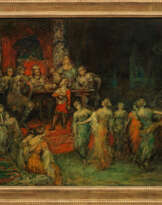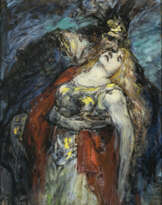ID 842649
Lot 818 | Ferdinand Leeke
Estimate value
€ 12 000 – 16 000
Title: Procession of Dancing Bacchantes in front of a Statue of Venus.
Technique: Oil on canvas.
Measurement: 150 x 200cm.
Notation: Signed and dated lower left: Ferdinand Leeke / München 1918.
Frame: Framed.
Provenance:
Private ownership, Denmark.
Ferdinand Leeke is particularly known for his scenes from Richard Wagner's operas, which were created between 1889 and 1898. He studied at the Academy of Fine Arts in Munich and was deeply connected to the art scene there. His stylistic classification is by no means clear-cut: his style, for example, resembles a cross between Symbolism and influences from the Victorian Pre-Raphaelites, who were fascinated by medieval sagas and myths.
With the Triumph of Bacchus, Leeke depicts a subject that has been popular since antiquity. From the left, the triumphal procession comes to the centre of the feast with outbursting and dancing movements full of joy. Bacchus is carried by his entourage, holding his beloved bride Ariadne in his arms.
His head is adorned with a crown of ivy in accordance with the iconographic ideal. The entourage waits in the centre; the expanse of the sea opens up in the background. Through the airy application of paint, which is particularly evident in the clothing, Leeke lends the exuberant celebration, which is bursting with dynamic moments, a gentle and sweet character, which at the same time lightly submerges the subject in mysticism.
| Artist: | Ferdinand Leeke (1859 - 1937) |
|---|---|
| Applied technique: | Oil |
| Auction house category: | Paintings 19th Century |
| Artist: | Ferdinand Leeke (1859 - 1937) |
|---|---|
| Applied technique: | Oil |
| Auction house category: | Paintings 19th Century |
| Address of auction |
VAN HAM Kunstauktionen GmbH Hitzelerstr. 2 50968 Köln Germany | ||||||||||||||
|---|---|---|---|---|---|---|---|---|---|---|---|---|---|---|---|
| Preview |
| ||||||||||||||
| Phone | +49 221 92586215 | ||||||||||||||
| Fax | +49 221 92 58 62 4 | ||||||||||||||
| Buyer Premium | 32% | ||||||||||||||
| Conditions of purchase | Conditions of purchase | ||||||||||||||
| Business hours | Business hours
|














